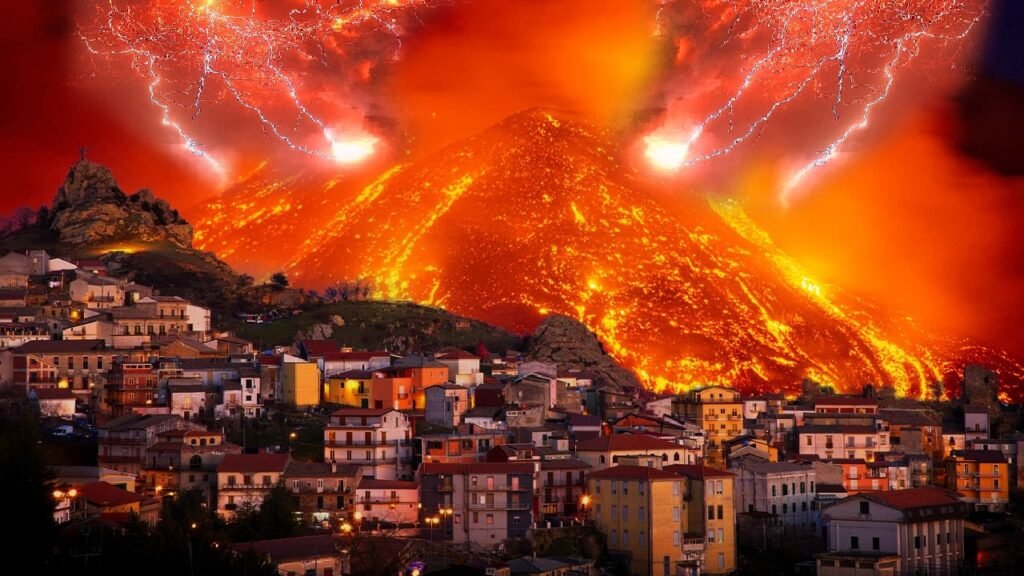A volcano in Ethiopia’s Afar region erupted for the first time in nearly 12,000 years, capturing global attention. Massive plumes of ash and smoke rose up to 14 kilometers into the sky, showcasing the immense geological power of the Rift Valley. This eruption has implications for air travel, climate, and nearby countries.
Eruption Details and Location
The Afar volcano is located in northeastern Ethiopia, part of the geologically active Rift Valley. Scientists describe this eruption as a rare event due to the volcano being dormant for thousands of years.
-
Eruption height: 14 kilometers
-
Ash and smoke spread: Yemen, Oman, India, northern Pakistan
-
Local impact: Southern Pakistan, including Karachi, remains mostly unaffected
Ash Cloud Drift and Regional Effects
According to the Pakistan Meteorological Department (PMD), the ash cloud is moving toward several countries. Although it poses little immediate danger to southern Pakistan, authorities remain alert to monitor air quality and potential flight disruptions.
Ash clouds can affect visibility, air travel, and respiratory health in certain regions if concentrations are high.
Why This Eruption Matters
Volcanic eruptions like this one demonstrate the immense geological forces beneath the Earth’s surface. The Afar region sits along the East African Rift, a zone where tectonic plates are gradually pulling apart.
Scientists are studying the eruption to better understand volcanic activity, predict future events, and assess any risks to nearby populations.
Safety Measures and Monitoring
Authorities in Ethiopia and neighboring countries are closely monitoring the situation. Air travel agencies are being informed of ash cloud paths, while residents are advised to stay updated on local advisories.
Precautionary steps include:
-
Avoiding unnecessary travel in ash-affected areas
-
Using masks to prevent respiratory irritation
-
Monitoring official updates from meteorological and geological departments
Global Perspective
While Ethiopia faces a rare geological event, the eruption’s global visibility is significant. Scientists note that volcanic eruptions can have long-term effects on climate, such as temporary cooling due to sunlight-blocking ash particles.
For neighboring countries like Yemen, Oman, India, and Pakistan, monitoring ash drift is crucial for environmental and aviation safety.
Conclusion
Ethiopia’s Afar volcano eruption after nearly 12,000 years reminds us of nature’s unpredictable power. While southern Pakistan and other regions may not face immediate threats, authorities and residents must stay vigilant. Scientists will continue to study the eruption for insights into the Rift Valley’s geological activity.
Read More: IMF Flags Risks in Pakistan’s Sovereign Wealth Funds



7 Comments
Vk777game – Definitely worth playing if you’re looking for something new. I’ve sunk way too many hours into this already. Seriously, check it out! Enjoy vk777game vk777game
chơi bài 66b Người chơi sẽ được hoàn lại,25% tổng số tiền đặt cược mỗi ngày, không giới hạn tối đa. Chính sách này áp dụng cho tất cả các loại hình cá cược, bao gồm Thể Thao và Quay Số (Saba), giúp giảm thiểu rủi ro và tối đa hóa lợi nhuận.
If you’re looking for some good slot action, 177slot is where it’s at for me. Pretty awesome selection of the new machines! Take a swing: 177slot
Okay, so I jumped into cwinsgame just to see what’s up. Surprisingly good games! I spent way too long playing one. Definitely worth a look if you’re bored. –> cwinsgame
Yo, 56jlapp is convenient for mobile play. Easy to find your way around the app and games load quickly if your internet is good. Worth checking out: 56jlapp
OkWing Gift Code Today, I’m hunting for a gift code to get a bonus. Where are those at?! I need an edge! Get your code here: okwingiftcodetoday
trang chủ 66b Điều này đồng nghĩa với việc nếu bạn nạp 1 triệu đồng, bạn có thể nhận thêm 1 triệu đồng nữa để tham gia các trò. Đây là cơ hội tuyệt vời để tân binh mới có thể làm quen và trải nghiệm nhiều dịch vụ tại đây mà không lo mất quá nhiều vốn ban đầu.